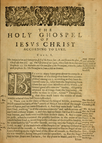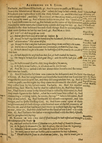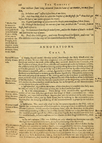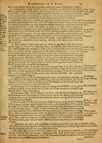The Annunciation and Conception, first of the Precursor: (26) and six months after, of Christ also himself. (39) The Visitation of our Lady, where both the mothers do Prophesy. (57) The Nativity and Circumcision of the Precursor, where his father doth prophesy. (80) The Precursor is from a child an Eremite.
BECAUSE many have gone about to compile a narration of the things that have been accomplished among us; 2according as they have delivered unto us, who from the beginning themselves saw and were Ministers of the Word; 3it seemed good also unto me • having diligently attained to all things from the beginning, to write to thee in order, Good * Theophilus, 4that thou mayest know the verity of those words whereof thou hast been instructed.
5There was in the days of Herod the King of Jewry, a certain Priest named Zachary, of the * course of Abia; and his wife of the daughters of Aaron, and her name Elizabeth. 6And they were both • just before God, walking • in all the commandments • and justifications of our Lord without blame, 7and they had no son: for that Elizabeth was barren, and both were well-stricken in their days. 8And it came to pass, when he executed the priestly function in the order of his course before God, 9according to the custom of the priestly function, he went forth by lot * to offer incense, entering into the Temple of our Lord; 10and all the multitude of the People was [a] praying without at the hour of the incense. 11And there appeared to him an Angel of our Lord, standing on the right hand of the Altar of incense. 12And Zachary was troubled, seeing him; and fear fell upon him. 13But the Angel said to him: Fear not Zachary, for thy prayer is heard; and thy wife Elizabeth shall bear thee a son, and thou shalt call his name John: 14and thou shalt have • joy and exultation, and many shall rejoice in his nativity. 15For he shall be great before our Lord; [b] and wine and cider he shall not drink; and he shall be replenished with the Holy Ghost even from his mother’s womb. 16And he shall * convert many of the children of Israel to the Lord their God. 17And he shall go before him * in the spirit and virtue of Elias, that he may convert the hearts of the Fathers unto the children, and the incredulous to the wisdom of the just, to prepare unto the Lord a perfect People. 18And Zachary said to the Angel: Whereby shall I know this? for I am old; and my wife is well-stricken in her days. 19And the Angel answering said to him: I am Gabriel that assist before God; and am sent to speak to thee, and to Evangelise these things to thee. 20And behold, [c] thou shalt be dumb, and shalt not be able to speak until the day wherein these things shall be done; for-because thou hast not believed my words, which shall be fulfilled in their time. 21And the People were expecting Zachary; and they marvelled that he made tarriance in the Temple. 22And coming forth he could not speak to them, and they knew that he had seen a vision in the Temple. And he made signs to them, and remained dumb. 23And it came to pass, after the days of his office were expired, • he departed into his house. 24And after these days Elizabeth his wife conceived; and hid herself five months, saying: 25For thus hath our Lord done to me in the days wherein he had respect to take away my reproach among men.
26 b And in the sixth month, the Angel Gabriel was sent of God into a city of Galilee, called Nazareth, 27 * to a Virgin espoused to a man whose name was Joseph, of the house of David; and the Virgin’s name was Mary. 28And the Angel being entered in, said unto her: • Hail • full of grace, our Lord is with thee: blessed art thou among women. 29Who having heard, was troubled at his saying, and thought what manner of salutation this should be. 30And the Angel said to her: Fear not Mary, for thou hast found grace with God. 31 * Behold thou shalt conceive in thy womb, and shalt bear a Son; and thou shalt call his name Jesus. 32He shall be great, and shall be called the Son of the most High, and our Lord God shall give him the seat of David his Father: 33 * and he shall reign in the house of Jacob for ever, and of his Kingdom there shall be no end. 34And Mary said to the Angel: [d] How shall this be done, • because I know not man? 35And the Angel answering, said to her: The Holy Ghost shall come upon thee, and the power of the most High shall overshadow thee. And therefore also that which of thee shall be born Holy, shall be called the Son of God. 36And behold • Elizabeth thy cousin, she also hath conceived a Son in her old age; and this month, is the sixth to her that is called barren; 37because there shall not be impossible with God any word. 38And Mary said, [e] Behold the handmaid of our Lord, be it done to me according to thy word. And the Angel departed from her.
39 c And Mary rising up in those days, went unto the hill country with speed into a city of Juda. 40And she entered into the house of Zachary, and saluted Elizabeth. 41And it came to pass; as Elizabeth heard the salutation of Mary, the [f] infant did leap in her womb. And Elizabeth was replenished with the Holy Ghost: 42and she cried out with a loud voice, and said, • Blessed art thou among women, and Blessed is the fruit of thy womb. 43And whence is this to me, that the • mother of my Lord doth come to me? 44For behold as the voice of thy salutation sounded in mine ears, the infant in my womb did leap for joy. 45And Blessed is she that believed because those things shall be accomplished that were spoken to her by our Lord. 46And Mary said:
MY SOUL doth magnify our Lord:
47And my spirit hath rejoiced in God my Saviour.
48Because he hath regarded the humility of his handmaid; for behold from henceforth [g] all Generations • shall call me Blessed.
49Because he that is mighty hath done great things to me; and holy is his name.
50And his mercy from Generation unto Generations, to them that fear him.
51He hath showed might in his arm: he hath dispersed the proud in the conceit of their heart.
52He hath deposed the mighty from their seat, and hath exalted the humble.
53The hungry he hath filled with good things: and the rich he hath sent away empty.
54He hath received Israel his child, being mindful of his mercy,
55As he spoke to our Fathers, to Abraham and his seed for ever.
56And Mary tarried with her about three months: and she returned into her house.
57And Elizabeth’s full time was come to be delivered; and she bare a Son. 58And her neighbours and kinsfolk heard that our Lord did magnify his mercy with her, and they did congratulate her. 59And it came to pass; on the eighth day they came to circumcise the child, and they called him by his father’s name Zachary. 60And his mother answering, said: Not so, but he shall be called John. 61And they said to her: That there is none in thy kindred that is called by this name. 62And they made signs to his father, what he would have him called. 63And demanding a writing table, he wrote, saying: • * John is his name. And they all marvelled. 64And forthwith his mouth was opened, and his tongue, and he spoke blessing God. 65And fear came upon all their neighbours; and all these things were bruited over all the hill-country of Jewry: 66and all that had heard, laid them up in their heart, saying: What an one, trow ye, shall this child be? For the hand of our Lord was with him. 67And Zachary his father was replenished with the Holy Ghost; and he prophesied, saying:
68Blessed be our lord God of Israel: because he hath visited and wrought the redemption of his People:
69And hath erected the horn of salvation to us, in the house of David his servant.
70As he spoke by the mouth of his holy Prophets, that are from the beginning:
71Salvation from our enemies, and from the hand of all that hate us:
72To work mercy with our Fathers; and to remember his holy Testament,
73 * The oath which he swore to Abraham our father, 74that he would give to us.
That without fear being delivered from the hand of our enemies, we may serve him,
75In holiness and • justice before him, all our days.
76And thou child, shalt be called the Prophet of the Highest: for * thou shalt go before the face of our Lord to prepare his ways.
77To give knowledge of salvation to his People, unto remission of their sins,
78Through the bowels of the mercy of our God, in which • the * Orient, from on high, hath visited us.
79To illuminate them that sit in darkness, and in the shadow of death: to direct our feet into the way of peace.
80And the child grew, and was strengthened in spirit, and was [h] in the deserts until the day of his manifestation to Israel.
Footnotes
- ↑ We see here that the Priest did his duty within, the People in the meantime praying without: and that the Priest’s functions did profit them though they neither heard nor saw his doings.
- ↑ This abstinence foretold and prescribed by the Angel, showeth that it is a worthy thing, and an act of religion in St. John, as it was in the Nazarites.
- ↑ Zachary punished for doubting of the Angel’s word.
- ↑ She doubted not of the thing as Zachary, but enquired, of the means.
- ↑ At this very moment when the Bl. Virgin gave consent, she conceived him perfect God and perfect man.
- ↑ John the Baptist being yet in his mother’s womb, rejoiced and acknowledged the presence of Christ and his mother.
- ↑ Have the Protestants had always Generations to fulfill this prophecy? or do they call her Blessed, that derogate what they can from her graces, blessings and all her honour?
- ↑ Mark that he was a voluntary Eremite, and chose to be solitary from a child, till he was to preach to the People, in so much that antiquity counted him the first Eremite. Jero. in vit. Pauli.
ANNOTATIONS. CHAP. 1.
↑ 3. Having diligently attained.) Hereby we see, that though the Holy Ghost ruled the pen of holy Writers that they might not err, yet did they use human means to search out and find the truth of the things they wrote of. Even so do Councils, and the President of them, God’s Vicar, discuss and examine all causes by human means, the assistance of the Holy Ghost concurring and directing them into all truth, according to Christ’s promise Joh. 16, 13: as in the very first Council of the Apostles themselves at Jerusalem is manifest. Act. 15, 7. and 28. Again here we have a familiar preface of the Author as to his friend or to every godly Reader (signified by Theophilus) concerning the cause and purpose and manner of his writing, and yet the very same is confessed Scripture, with the whole book following. Marvel not then if the Author of the second book of the Machabees use the like human speeches both at the beginning and in the later end; neither do thou therefore reject the book for no Scripture, as our Heretics do; or not think him a sacred Writer.
↑ 6. Just before God.) Against the Heretics of this time, here it is evident that holy men be just, not only by the estimation of men, but in deed and before God.
↑ 6. In all the commandments.) Three things to be noted directly against the Heretics of our time. First, that good men do keep all God’s commandments: which (they say) are impossible to be kept. Again, that men be justified not by only imputation of Christ’s justice, nor by faith alone, but by walking in the commandments. Again, that the keeping and doing of the commandments is properly our justification.
↑ 6. Justifications.) This word is so usual in the Scriptures (namely in the Psal. 118) to signify the commandments of God, because the keeping of them is justification, and the Greek is always so fully correspondent to the same, that the Heretics in this place (otherwise pretending to esteem much of the Greek) blush not to say, that they avoid this word of purpose against the justification of the Papists. And therefore one useth Tully’s word forsooth, in Latin constituta: and his scholars in their English Bibles say, Ordinances.
↑ 14. Joy and exultation.) This was fulfilled, not only when he was born, but now also through the whole Church for ever, in joyful celebrating of his Nativity.
↑ 23. He departed.) In the old Law (saith St. Jerom) they that offered Hosts for the People, were not only not in their houses, but were purified for the time, being separated from their wives, and they drank neither wine nor any strong drink, which are wont to provoke concupiscence. Much more the Priests of the new Law that must always offer Sacrifices, must always be free from matrimony. Lib. 1. ch. 6. 19. adv. Jovin. and ep. 50. ch. 3. See St. Ambrose in 1 Tim. 3. And therefore if there were any religion in Calvin’s Communion, they would at the least give as much reverence in this point, as they in the old Law did to their Sacrifices, and to the loaves of proposition, 1 Reg. 21.
↑ 28. Hail full of grace.) Holy Church and all true Christian men do much and often use these words brought from Heaven by the Archangel, as well to the honour of Christ and our Bl. Lady, as also for that they were the words of the first glad tidings of Christ’s Incarnation and our Salvation by the same; and be the very abridgement and sum of the whole Ghospel. In so much that the Greek Church used it daily in the Masse.
↑ 28. Full of grace.) Note the excellent prerogatives of our Bl. Lady, and abhor those Heretics which make her no better than other vulgar women, and therefore to take from her fullness of grace, they say here, Hail freely beloved, contrary to all signification of the Greek word, which is at the least, endued with grace, as St. Paul useth it, Ephes. 1, by St. Chrysostom’s interpretation: or rather, full of grace, as both Greek and Latin Fathers have always here understood it, and the Latins also read it, namely St. Ambrose thus, well is she only called full of grace, who only obtained the grace, which no other woman deserved, to be replenished with the author of grace. And if they did as well know the nature of these kind of Greek words, as they would seem very skilfull, they might easily observe that they signify fullness, as when themselves translate the like word (Luc. 16, 20.) full of sores. Beza, ulcerosus.
↑ 34. I know not man.) These words declare (saith St. Augustine) that she had now vowed virginity to God. For otherwise neither would she say: How shall this be done? nor have added: because I know not man. Yea if she had said only the first words: How shall this be done; it is evident that she would not have asked such a question, how a woman should bear a son promised her, if she had married meaning to have carnal copulation ch. 4 de Virg. As if he should say, If she might have known a man and so have had a child, she would never have asked: How shall this be done; but because that ordinary way was excluded by her vow of virginity, therefore she asketh: How? And in asking: How? she plainly declareth that she might not have a child by knowing man, because of her vow. See St. Grego. Nyssene de sancta Christi Nativitate.
↑ 36. Elizabeth thy cousin.) By this that Elizabeth and our Lady were cousins, the one of the Tribe of Levi, the other of Juda, is gathered that Christ came of both Tribes, Juda and Levi, of the Kings and the Priests himself both a King and a Priest, and the Anointed (to wit) by grace spiritually, as they were with oil materially and corporally. August. lib. 2 de Consens. Evang. ch. 1.
↑ 42. Blessed art thou.) At the very hearing of our Lady’s voice, the infant and She were replenished with the Holy Ghost, and she sang praises not only to Christ, but for his sake to our Bl. Lady, calling her Blessed and her fruit Blessed, as the Church doeth also by her words and example in the AVE MARIA.
↑ 43. Mother of my Lord.) Elizabeth being an exceeding just and Blessed woman, yet the worthiness of God’s mother doth so far excel her and all other women, as the great light the little stars. Jero. Praef. in Sophon.
↑ 48. Shall call me Blessed.) This Prophecy is fulfilled, when the Church keepeth her Festival days, and when the Faithful in all Generations say the Ave Mary, and other holy Anthems of our Lady. And therefore the Calvinists are not among those Generations which call our Lady Blessed.
↑ 63. John is his name.) We see that names are of signification and importance, God himself changing or giving names in both Testaments; as, Abraham, Israel, Peter, and the principal of all others, Jesus; and here John, which signifieth, God’s grace or mercy, or, God will have mercy. For he was the Precursor and Prophet of the mercy and grace that ensued by Christ Jesus. Note also that as then in Circumcision, so now in Baptism (which answereth thereunto) names are given. And as we see here and in all the old Testament, great respect was had of names: so we must beware of strange, profane, and secular names (nowadays too common) and rather according to the Catechism of the holy Council of Trent, take names of Saints and holy men, that may put us in mind of their virtues.
↑ 75. Justice before him.) Here also we see that we may have true justice, not only in the sight of men, or by the imputation of God, but indeed before him and in his sight and that the coming of Christ was to give men such justice.
↑ 78. The Orient.) Marvel not if Heretics control the old authentical translation, as though it differed from the Greek; wheras here they make much ado to control not only all the Greek Interpreters of the old Testament, but also St. Luke himself, for the word ανατολη, as differing from the Hebrew.
Margin Notes
- THE FIRST part: of the Infancy both of the Precurser and of Christ Himself.
- 5–17. The Ghospel upon the eve of St. John Baptist.
- 26–38. b The Gospel upon the Annunciation of our Lady, March 25. And on Ember Wednesday, and for a votive Mass of our Lady in Advent.
- 28. The beginning of the AVE MARIA, See the rest v. 42.
- 39–47. c The Ghospel upon the Visitation of our Lady, Jul. 2. And upon the Ember friday in Advent.
- 46–55. Magnificat at Evensong.
- 57–68. The Ghospel upon the Nativity of St. John Baptist Jun. 24. called Midsommer day.
- 68–79. Benedictus at Laudes.
- annot. 3. Sacred writers and holy Councels.
- annot. 3. The second book of the Machabees.
- annot. 6. True justification by observing the commandments.
- annot. 6. Corrupt translation of Heretics.
- annot. 6. δικαιωματα
- annot. 21. The continence of Priests.
- annot. 28. Often saying of the Ave Maria.
- annot. 28. Corrupt translation of Heretics.
- annot. 28. κεχαριτωμενη. εκαριτωσε
- annot. 28. ελκωμενος
- annot. 34. Our Bl. Lady vowed virginity.
- annot. 36. Christ came of both Tribes, Juda and Levi.
- annot. 42. The Blessed Virgin Mary.
- annot. 43. Her excellence.
- annot. 48. Her honour in all the world.
- annot. 63. Mystery and signification in names.
- annot. 63. What names to be given in Baptism.
- annot. 75. True justice, not imputative.
- annot. 78. The Heretics control both Greek and Latin text.
Margin References
- 3. Act. 1, 2.
- 5. 1 Par. 24, 10.
- 9. Exo. 3, 17.
- 9. Lev. 16, 16.
- 16. Mal. 4, 6.
- 17. Mat. 11, 14.
- 27. Mat. 1, 18.
- 31. Esa. 7, 14.
- 33. Dan. 7, 14, 27.
- 63. Luc. 1, 13.
- 73. Gen. 22, 6.
- 76. Mal. 3, 1.
- 78. Zac. 3, 9. 6, 12. Mal. 4, 2.
- annot. 3. 2 Mac. 2. and 15.
- annot. 6. Beza in Annot. no. Test. 1556.
- annot. 28. Liturg. Sts. Jacobi and Chrys.
- annot. 28. S. Atha. de St. Deip. St. Ephrem in orat. de laud. Bl. virg. Ambr. in 1 Luc. lib. 2. Jer, ep. 140 in exp. Psa. 44.
- annot. 63. ch. de Bap. in fine.
- annot. 78. Beza.





